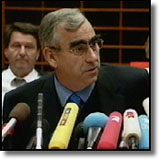
|
France Puts Brakes on EuroThe new Socialist-led government in France has said it's not yet ready to accept an agreement setting out the rules for running the single European currency.This puts France at odds with its neighbour, Germany, and places a large question mark over whether the project can now go ahead as planned. The Finance Minister, Dominique Strauss-Kahn, told his counterparts at a meeting in Luxembourg that France wanted more time to consider the stability pact. Any hint of an unravelling of the EU's plans for a single currency adds fuel to the belief of some in the market that EMU may have to be delayed from its January 1, 1999 start date.
German Finance Minister Theo Waigel, himself recently at the centre of a storm over plans to revalue German gold reserves to help meet the economic targets for EMU tests, was adamant the plan would not unravel. "What has been agreed upon and discussed for two years can no longer be put up for negotiation," Mr Waigel said. The agreement was finalised last December, and is due to be ratified at the European summit in Amsterdam next week. It would impose tight budgetary discipline on countries inside the monetary union. Mr Strauss-Kahn insisted that France was not seeking a re-negotiation of the stability pact, but wanted to find a way of increasing the emphasis on job creation The President of the European Commission, Jacques Santer, said he still hoped the stability pact would be adopted at the Amsterdam summit. And the German government rejected any suggestion that the starting date for the single currency - January 1st 1999 -- might be delayed. Mr Strauss-Kahn's move triggered a scramble to find a compromise that could paper over the problem and allow for a successful summit. MrSanter will go to Paris on Thursday to see the French Prime Minister Lionel Jospin with a proposal, EU sources said. Mr Strauss-Kahn said it would take more than a week for Paris to consider the stability pact, which France wants to be amended with an attachment on employment. Officials said Strauss-Kahn had said the new French government wanted to discuss the plan with the National Assembly and could not do so until June 19, two days after the Amsterdam summit.
|
Diana, Princess of Wales, 1961-1997
Conference 97
Devolution
The Archive
News |
Issues |
Background |
Parties |
Analysis |
TV/Radio/Web
Interactive |
Forum |
Live |
About This Site
News |
Issues |
Background |
Parties |
Analysis |
TV/Radio/Web
Interactive |
Forum |
Live |
About This Site
© BBC 1997 |
politics97@bbc.co.uk |

